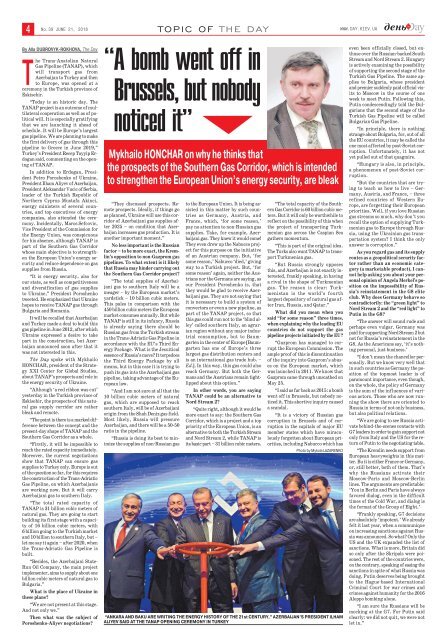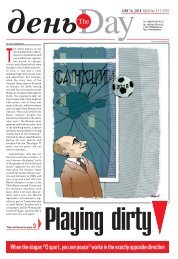You also want an ePaper? Increase the reach of your titles
YUMPU automatically turns print PDFs into web optimized ePapers that Google loves.
4<br />
No.39 JUNE 21, 2018<br />
TOPIC OF THE DAY<br />
WWW.DAY.KIEV.UA<br />
By Alla DUBROVYK-ROKHOVA, The Day<br />
The Trans-Anatolian Natural<br />
Gas Pipeline (TANAP), which<br />
will transport gas from<br />
Azerbaijan to Turkey and then<br />
to Europe, was opened at a<br />
ceremony in the Turkish province of<br />
Eskisehir.<br />
“Today is an historic day. The<br />
TANAP project is an outcome of multilateral<br />
cooperation as well as of political<br />
will. It is especially gratifying<br />
that we are launching it ahead of<br />
schedule. It will be Europe’s largest<br />
gas pipeline. We are planning to make<br />
the first delivery of gas through this<br />
pipeline to Greece in June 2019,”<br />
Turkey’s President Recep Tayyip Erdogan<br />
said, commenting on the opening<br />
of TANAP.<br />
In addition to Erdogan, President<br />
Petro Poroshenko of Ukraine,<br />
President Ilham Aliyev of Azerbaijan,<br />
President Aleksandar Vucic of Serbia,<br />
leader of the Turkish Republic of<br />
Northern Cyprus Mustafa Akinci,<br />
energy ministers of several countries,<br />
and top executives of energy<br />
companies, also attended the ceremony.<br />
Incidentally, Maros Sefcovic,<br />
Vice President of the Commission for<br />
the Energy Union, was conspicuous<br />
for his absence, although TANAP is<br />
part of the Southern Gas Corridor<br />
whose main objective is to strengthen<br />
the European Union’s energy security<br />
and reduce dependence on gas<br />
supplies from Russia.<br />
“It is energy security, also for<br />
our state, as well as competitiveness<br />
and diversification of gas supplies<br />
to Ukraine,” President Poroshenko<br />
tweeted. He emphasized that Ukraine<br />
hopes to receive TANAP gas through<br />
Bulgaria and Romania.<br />
It will be recalled that Azerbaijan<br />
and Turkey made a deal to build this<br />
gas pipeline in June 2012, after which<br />
Ukraine expressed a desire to take<br />
part in the construction, but Azerbaijan<br />
announced soon after that it<br />
was not interested in this.<br />
The Day spoke with Mykhailo<br />
HONCHAR, president of the Strategy<br />
XXI Center for Global Studies,<br />
about TANAP’s prospects and role in<br />
the energy security of Ukraine.<br />
“Although ‘a red ribbon was cut’<br />
yesterday in the Turkish province of<br />
Eskisehir, the prospects of this natural<br />
gas supply corridor are rather<br />
bleak and remote.<br />
“The point is there is a marked difference<br />
between the concept and the<br />
present-day shape of TANAP and the<br />
Southern Gas Corridor as a whole.<br />
“Firstly, it will be impossible to<br />
reach the rated capacity immediately.<br />
Moreover, the current negotiations<br />
show that TANAP can ensure gas<br />
supplies to Turkey only. Europe is out<br />
of the question so far, for this requires<br />
the construction of the Trans-Adriatic<br />
Gas Pipeline, on which Azerbaijanis<br />
are working now. But it will carry<br />
Azerbaijani gas to southern Italy.<br />
“The total rated capacity of<br />
TANAP is 31 billion cubic meters of<br />
natural gas. They are going to start<br />
building its first stage with a capacity<br />
of 16 billion cubic meters, with<br />
6 billion going to the Turkish market<br />
and 10 billion to southern Italy, but –<br />
let me say it again – after 2020, when<br />
the Trans-Adriatic Gas Pipeline is<br />
built.<br />
“Besides, the Azerbaijani State-<br />
Run Oil Company, the main project<br />
implementer, aims to supply about one<br />
billion cubic meters of natural gas to<br />
Bulgaria.”<br />
What is the place of Ukraine in<br />
these plans?<br />
“We are not present at this stage.<br />
And not only we.”<br />
Then what was the subject of<br />
Poroshenko-Aliyev negotiations?<br />
“A bomb went off in<br />
Brussels,butnobody<br />
noticed it”<br />
Mykhailo HONCHAR on why he thinks that<br />
the prospects of the Southern Gas Corridor, which is intended<br />
to strengthen the European Union’s energy security, are bleak<br />
“They discussed prospects. Remote<br />
prospects. Ideally, if things go<br />
as planned, Ukraine will use this corridor<br />
of Azerbaijani gas supplies after<br />
2025 – on condition that Azerbaijan<br />
increases gas production. It is<br />
another important moment.”<br />
No less important is the Russian<br />
factor – to be more exact, the Kremlin’s<br />
opposition to non-Gazprom gas<br />
pipelines. To what extent is it likely<br />
that Russia may hinder carrying out<br />
the Southern Gas Corridor project?<br />
“The total supplies of Azerbaijani<br />
gas to southern Italy will be a<br />
meager – by the European market’s<br />
yardstick – 10 billion cubic meters.<br />
This pales in comparison with the<br />
450 billion cubic meters the European<br />
market consumes annually. But while<br />
TANAP is still in its infancy, Russia<br />
is already saying there should be<br />
Russian gas from the Turkish stream<br />
in the Trans-Adriatic Gas Pipeline in<br />
accordance with the EU’s Third Energy<br />
Package. What is the Jesuitical<br />
essence of Russia’s move? It torpedoes<br />
the Third Energy Package by all<br />
means, but in this case it is trying to<br />
push its gas into the Azerbaijani gas<br />
pipeline, taking advantage of the European<br />
law.<br />
“And I am not sure at all that the<br />
10 billion cubic meters of natural<br />
gas, which are supposed to reach<br />
southern Italy, will be of Azerbaijani<br />
origin from the Shah Deniz gas field.<br />
Most likely, Russia will pressure<br />
Azerbaijan, and there will be a 50-50<br />
ratio in the pipeline.<br />
“Russia is doing its best to minimize<br />
the supplies of non-Russian gas<br />
to the European Union. It is being assisted<br />
in this matter by such countries<br />
as Germany, Austria, and<br />
France, which, ‘for some reason,’<br />
pay no attention to non-Russian gas<br />
supplies. Take, for example, Azerbaijani<br />
gas. They knew it would come!<br />
They even drew up the Nabucco project<br />
for this purpose on the initiative<br />
of an Austrian company. But, ‘for<br />
some reason,’ Nabucco ‘died,’ giving<br />
way to a Turkish project. But, ‘for<br />
some reason’ again, neither the Austrians<br />
nor the Germans are saying, as<br />
our President Poroshenko is, that<br />
they would be glad to receive Azerbaijani<br />
gas. They are not saying that<br />
it is necessary to build a system of<br />
convectors or even a new pipeline, as<br />
part of the TANAP project, so that<br />
this gas could run not to the ‘blind alley’<br />
called southern Italy, an agrarian<br />
region without any major industrial<br />
consumption, but to Baumgarten<br />
in the center of Europe [Baumgarten<br />
has one of Europe’s three<br />
largest gas distribution centers and<br />
is an international gas trade hub. –<br />
Ed.]. In this way, this gas could also<br />
reach Germany. But both the Germans<br />
and the Austrians remain tightlipped<br />
about this option.”<br />
In other words, you are saying<br />
TANAP could be an alternative to<br />
Nord Stream 2?<br />
“Quite right, although it would be<br />
more exact to say: the Southern Gas<br />
Corridor, which is a project and a top<br />
priority of the European Union, is an<br />
alternative to both the Turkish Stream<br />
and Nord Stream 2, while TANAP is<br />
its basic part – 31 billion cubic meters.<br />
“The total capacity of the Southern<br />
Gas Corridor is 60 billion cubic meters.<br />
But it will only be worthwhile to<br />
reflect on the possibility of this when<br />
the project of transporting Turkmenian<br />
gas across the Caspian Sea<br />
gathers momentum.<br />
“This is part of the original idea.<br />
The Turks also want TANAP to transport<br />
Turkmenian gas.<br />
“But Russia strongly opposes<br />
this, and Azerbaijan is not exactly interested,<br />
frankly speaking, in having<br />
a rival in the shape of Turkmenian<br />
gas. The reason is clear: Turkmenistan<br />
is the world’s fourth<br />
largest depository of natural gas after<br />
Iran, Russia, and Qatar.”<br />
What did you mean when you<br />
said “for some reason” three times,<br />
when explaining why the leading EU<br />
countries do not support the gas<br />
pipeline projects initiated by the EU?<br />
“Gazprom has managed to corrupt<br />
the European Commission. The<br />
ample proof of this is discontinuation<br />
of the inquiry into Gazprom’s abuses<br />
on the European market, which<br />
was launched in 2011. We know that<br />
Gazprom came through unscathed on<br />
May 25.<br />
“I said as far back as 2015: a bomb<br />
went off in Brussels, but nobody noticed<br />
it. This abortive inquiry caused<br />
a scandal.<br />
“It is a victory of Russian gas<br />
corruption in Brussels and of corruption<br />
in the capitals of major EU<br />
member states which have miraculously<br />
forgotten about European priorities,<br />
including Nabucco which has<br />
Photo by Mykola LAZARENKO<br />
“ANKARA AND BAKU ARE WRITING THE ENERGY HISTORY OF THE 21st CENTURY,” AZERBAIJAN’S PRESIDENT ILHAM<br />
ALIYEV SAID AT THE TANAP OPENING CEREMONY IN TURKEY<br />
even been officially closed, but enthuse<br />
over the Russian-backed South<br />
Stream and Nord Stream 2. Hungary<br />
is actively examining the possibility<br />
of supporting the second stage of the<br />
Turkish Gas Pipeline. The same applies<br />
to Bulgaria, whose president<br />
and premier suddenly paid official visits<br />
to Moscow in the course of one<br />
week to meet Putin. Following this,<br />
Putin condescendingly told the Bulgarians<br />
that the second stage of the<br />
Turkish Gas Pipeline will be called<br />
Bulgarian Gas Pipeline.<br />
“In principle, there is nothing<br />
strange about Bulgaria, for, out of all<br />
the EU countries, it may be called the<br />
one most affected by post-Soviet corruption.<br />
Unfortunately, it has not<br />
yet pulled out of that quagmire.<br />
“Hungary is also, in principle,<br />
a phenomenon of post-Soviet corruption.<br />
“But the countries that are trying<br />
to teach us how to live – Germany,<br />
Austria, and France, – three<br />
refined countries of Western Europe,<br />
are forgetting their European<br />
priorities. Well, if you love Russian<br />
gas streams so much, why don’t you<br />
recall the option of supplying Turkmenian<br />
gas to Europe through Russia,<br />
using the Ukrainian gas transportation<br />
system? I think the only<br />
answer is corruption.”<br />
As you regard gas and its supply<br />
routes as a geopolitical security factor<br />
rather than an economic category<br />
(a marketable product), I cannot<br />
help asking you about your personal<br />
opinion of Angela Merkel’s position<br />
on the impossibility of Russia’s<br />
reinstatement in the G8 elite<br />
club. Why does Germany behave so<br />
contradictorily: the “green light” to<br />
Nord Stream 2 and the “red light” to<br />
Putin in the G8?<br />
“The answer will sound rude and<br />
perhaps even vulgar. Germany was<br />
paid for supporting Nord Stream 2 but<br />
not for Russia’s reinstatement in the<br />
G8. As the Americans say, ‘it’s nothing<br />
personal, just business.’<br />
“I don’t mean the chancellor personally.<br />
But we know very well that<br />
in such countries as Germany the position<br />
of the topmost leader is of<br />
paramount importance, even though,<br />
on the whole, the policy of Germany<br />
is the sum of the influences of various<br />
actors. Those who are now running<br />
the show there are oriented to<br />
Russia in terms of not only business,<br />
but also political relations.<br />
“We are going to see Russia activate<br />
behind-the-scenes contacts with<br />
G7 leaders in order to gain support not<br />
only from Italy and the US for the return<br />
of Putin to the negotiating table.<br />
“The Kremlin needs support from<br />
European heavyweights in this matter.<br />
Bu it is either France or Germany,<br />
or, still better, both of them. That’s<br />
why the Russians activate their<br />
Moscow-Paris and Moscow-Berlin<br />
lines. The arguments are predictable:<br />
‘You in Berlin and Paris have always<br />
favored dialog, even in the difficult<br />
times of the Cold War, and dialog is<br />
the format of the Group of Eight.’<br />
“Frankly speaking, G7 decisions<br />
are absolutely ‘impotent.’ We already<br />
felt it last year, when a communique<br />
on increasing sanctions against Russia<br />
was announced. So what? Only the<br />
US and the UK expanded the list of<br />
sanctions. What is more, Britain did<br />
so only after the Skripals were poisoned.<br />
The rest of the countries were,<br />
on the contrary, speaking of easing the<br />
sanctions in spite of what Russia was<br />
doing. Putin deserves being brought<br />
to the Hague-based International<br />
Criminal Court for war crimes and<br />
crimes against humanity for the 2016<br />
Aleppo bombing alone.<br />
“I am sure the Russians will be<br />
mocking at the G7. For Putin said<br />
clearly: we did not quit, we were not<br />
let in.”
















